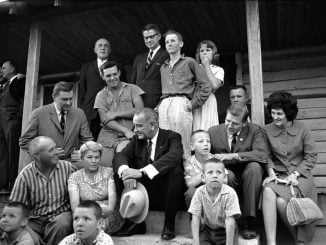
Hamilton” is a juggernaut musical currently fetching at least $700 for prime seats. It’s a civic class in hip hop, George Washington’s cabinet argument as rap battle for the future of the fledgling American economy: Jefferson’s rural and agricultural against Hamilton’s urban and commercial. Reason in rhyme with best disses wins, which is not too far from the truth. Jefferson and Hamilton are at the opposite ends and no one wins. So they strike a compromise, both losing to win.A piece in the musical titled “The Room Where it Happens” is a retelling of that compromise over a dinner. Hamilton gets the federal government to assume state debt and tax individual states for it while Jefferson gets the capitol, destined for Pennsylvania, closer to his home on the Potomac. Historians call that dinner the “Compromise of 1790.”The current demonizing of compromise as the bane of Washington politics is a travesty, a straw man used by candidates to win cheap votes which leads to the farce of politicians running as “non-politicians.” To some, Mr. Trump’s non-political background and political ineptitude makes him the best politician.In previous columns I argued that conversation and compromise, the scapegoat for everything ugly in politics, is what we must get better at. My closing argument is for more compromise.Compromise is virtue, a display of strength. Compromise takes hours of talk, and energy to keep oiling tension between opposite minds. And if the compromise goes through, you have the new task of making it work, and then living with it, explaining it to your constituents. Not compromising is easier: shut your door and when it’s time for a report, sit on your high horse that you held to your ground, which is euphemism for “doing nothing.” You are lauded for laziness.If you compromise you take ownership for the decision. When negative consequences bud, inevitable with any actions in a complex society like ours, deflections won’t be available. You will have to suck it up. On the other hand, if you don’t compromise, you can wag your clean fingers at others. The only way to be clean in politics is to avoid responsibility.Lincoln was a great compromiser, which made him a brilliant politician, which made him a great leader. We don’t associate compromising with Lincoln, imagining him holding our fracturing nation through single mindedness, fist thumping and declaring, “Union no matter the cost.” But he always knew the cost, always calculating what could be lost in order to win.Slavery was the hot topic of the presidential run of 1860 and he ran down a moderate line. Lincoln cut through the morass of moral arguments justifying slavery saying, “Whenever I hear anyone arguing for slavery I feel a strong impulse to see it tried on him personally.” But personal conviction is not the same as public policy, even if public policy should be grounded on personal morals. He never argued for abolishment. In a speech at New Haven, Connecticut, he explained, “We think slavery a great moral wrong, and while we do not claim the right to touch it where it exists, we wish to treat it as a wrong in the territories, where our votes will reach it.” He did not go far enough for some Northerners. He went too far for most Southerners. But he also won the confidence of enough people to win the presidency.The Emancipation Proclamation was a courageous act because it was Lincoln’s compromise with himself, going back on his own words from 1860. Today, he would have been crucified as a flip-flopper and lost the re-election. Changing position is part of the adaptability necessary for compromise. The Emancipation was driven by moral conviction, but also political savvy. It gave the Civil War a moral impetus. Men were not just fighting for the union but for freedom of all men, an American ideal. He also believed most Northerners were ready to accept what they would have rebelled against in 1860.Compromise is a practice of strength leading to a stronger union. We teach our children that a healthy family is where every person is strong enough to compromise. Why wouldn’t it be true of our republic?Samuel Son is a teaching pastor at New Life Triangle church in Raleigh and a leader in Micah Groups, a leadership formation ministry focused on justice.



